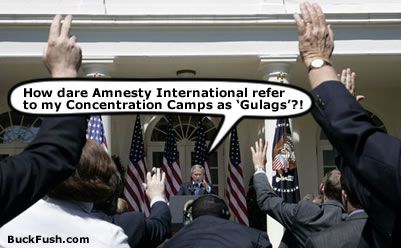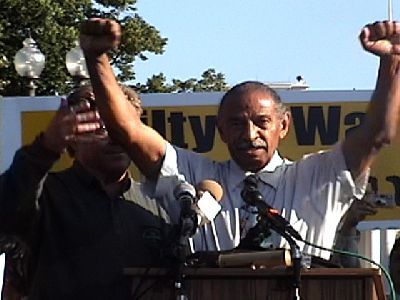Will two hearings — one official, the other not — be seen by historians as a turning point in ending the Bush regime’s misrule and
bringing its ring leaders to justice? It would be nice to think so. And maybe they will be, judging
from “Who We Are,” the lead
editorial in this morning’s New York Times about the Senate Judiciary Committee’s official
hearing on the prison camp at Guantanamo.
The Times has absorbed torrents of criticism, largely justified, for not taking on the regime in
the rush to war and not exposing the justification for invading Iraq, namely the imminent threat of
Saddam Hussein’s WMD, as the Big Lie it was. But some of its editorials have been the strongest
voices of opposition to the regime, and this morning’s is one.
Demanding (not for the first time) that the Guantánamo Detention Center be closed, it began
by praising Republican Sen. Arlen Specter, who heads the committee, for declaring “it was time
for Congress to do its job and bring the American chain of prison camps under the
law.”

The editorial continued:
While the hearing was too long in coming, its timing was useful — one day
after Defense Secretary Donald Rumsfeld, who should have been fired for bungling the Iraq war
and for the prison abuse scandal, offered the bizarre declaration that “no detention facility in the
history of warfare has been more transparent” than Guantánamo.
It sliced and diced William Barr, who was attorney general for President George H. W. Bush,
for “arrogantly dismiss[ing] the entire debate [over the legality of the camps] as a waste of time.
(“Rarely have I seen a controversy that has less substance behind it,” said Mr. Barr, who was sent
by the administration to dilute a panel of critics of the prison policy.) And it pointed out that
… the hearing only confirmed the urgency of subjecting the post-9/11
detention system to the rule of law — starting with the president’s legally dubious invention of
“unlawful enemy combatant.” J. Michael Wiggins, a deputy associate attorney general, said the
administration believed it could hold anyone given that label “in perpetuity” without even filing
charges. Excuse us, Mr. Barr, but that sounds like something of great substance, especially given
how bad the administration is at telling actual villains from taxi drivers who happen to be in the
wrong place at the wrong time.
 Similarly, perhaps it’s possible that historians will see a turning point
Similarly, perhaps it’s possible that historians will see a turning point
in the statement by Democratic Rep.
John Conyers Jr., right, the ranking Democrat on the House Judiciary Committee, who headed the
unofficial hearing on the Downing Street Memo:
If these [memo] disclosures are true — and so far no one from the Bush
Administration has bothered to respond to our letters — they establish a prima facie case of going
to war under false pretenses. This means that more than 1,600 brave Americans and hundreds of
thousands of innocent Iraqis would have lost their lives for a lie.
That is why we are here today. That is why 122 Members of Congress –which as of today
includes the Minority Leader — have asked the president to explain his actions. That is why more
than 550,000 Americans are joining with us in [a petition] demanding answers from the
Administration.
The Conyers hearing offered some of the most visceral criticism of the regime from elected
representatives of the people in a public forum that I’ve witnessed. The fact that the hearing had to
be held in a basement room of the Capitol under cramped conditions seemed to me to amplify its
power by emphasizing the grassroots nature of the exercise, while the regime’s tactic of mocking the memo and
dismissing the hearing evoked the condescension of benighted royalty.
Mitchelle Stephenson, of Edgewater, Md., caught the moment beautifully this morning in a
letter to the
editor of the Times:
According to Scott McClellan, the president’s chief spokesman, the concerns
of the antiwar panel convened in the Capitol’s basement … should be discounted because Mr.
Conyers, an elected officer of the legislative branch, “voted against the war in the first place.”
So in order for the administration to acknowledge dissent, the dissenters had to have agreed
with the administration in the first place? We have certainly arrived at a strange place in American
history.
And Richard Pfaehler, of Elverson, Pa., shows that a grassroots exercise can be a potent
weapon when it has the force of righteous morality, rather than McClellan’s self-righteous
indignation, behind it:
Mine is one of the 560,000 signatures on the petition that Representative John
Conyers Jr. presented to the White House on Thursday, seeking answers to questions about the
president’s decision to invade Iraq. …
The conflict we now find our nation mired in was, and continues to be, based on lies. These
lies have created many one-parent families. These lies have disgraced a nation. What is more
disgraceful than to make untrue statements with the intent to deceive, and thereby cause the death
of even a single individual.
